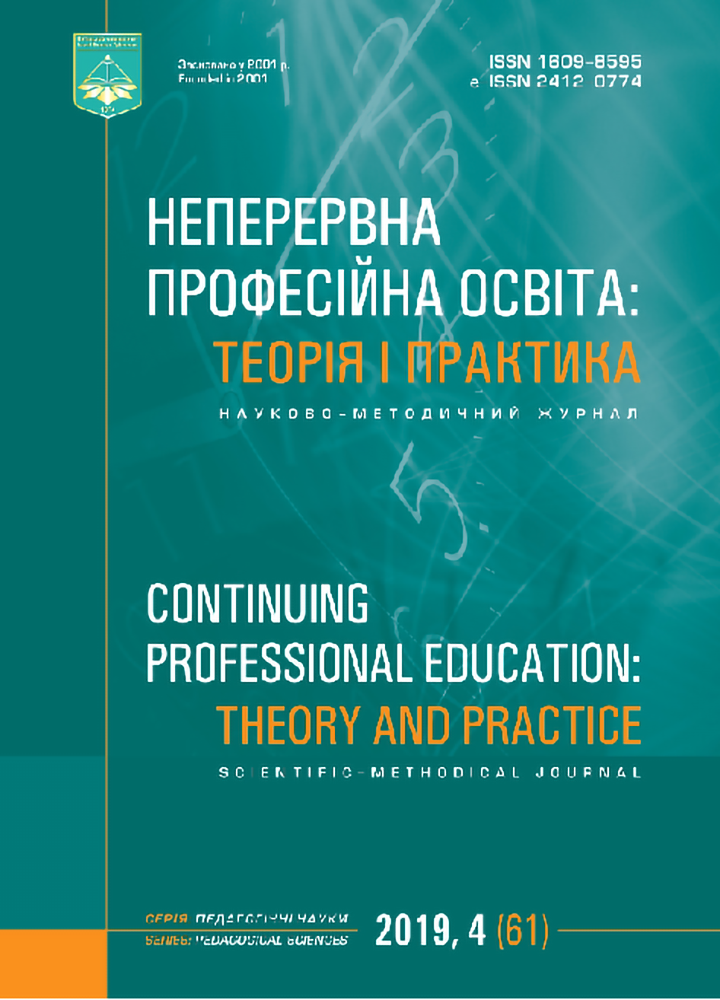CREATION OF A SINGLE EDUCATIONAL SPACE OF POSTGRADUATE EDUCATIONAL ESTABLISHMENTS
DOI:
https://doi.org/10.28925/1609-8595.2019.4.1318Keywords:
educational and professional activity, integration educational space, integration, primary school teachers, postgraduate education institutions, research activity, socio-cultural activityAbstract
he article theoretically justified the ways of creating a single educational space of postgraduate educational establishments on the basis of integration of educational, professional, research and social and cultural activities of teachers as a necessary component of preparation of primary school teachers for integrated learning and examines different approaches to education. Studies of domestic and foreign scientists in comparative analysis with the concept of «educational environment» and characterized the psychological and pedagogical conditions of the turn of the integration educational space of postgraduate institutions.
On the basis of the analysis, the author proposed to identify a system of components that make up the structure of the space of postgraduate education and are integrators in its creation, the emphasis is placed on the conceptual integration bases for the implementation of the characteristics of the components. It is emphasized on the unconventionality of educational and professional activity of elementary school teachers in the aspect of psycho-activity, activation of teachers’ research activity as a factor of improving the quality of their training, organization of socio-cultural activity in the conditions of postgraduate education as reasons for the development of adaptability and interpersonal relations.
Particular attention was paid to the use of integration of innovative activities that provide a dialectical interaction of the logic of the educational process, the development of subjects of learning and sociocultural adaptation in the new educational environment to achieve the didactic task of preparing teachers for the introduction of integration education in primary school.
References
Asmolov, O. G. (2002). Psihologiya lichnosti: Principy obshepsihologicheskogo analiza [Personality Psychology: Principles of General Psychological Analysis]. Moscow, Russia: Academy (rus)
Borytko, M. M. (2001). Pedagog v prostranstvah sovremennogo vospitaniya: monografiya [A teacher in the spaces of modern upbringing: a monograph]. Volgograd, Russia: Changes (rus).
Vilensky, M. Ya. & Meshcheryakova, E. V. (2002). Obrazovatelnoe prostranstvo kak pedagogicheskaya kategoriya [Educational space as a pedagogical category]. Teacher education and science, 2, 8–12 (rus).
Duranov, M. E. (2006). Upravlenie professionalnym obrazovaniem budushego specialista v vysshej shkole (sociokulturnyj aspekt): monografiya [Management of professional education of the future specialist in higher education (socio-cultural aspect): monograph]. Chelyabinsk, Russia: CHGAKI (rus).
Kochneva, E. M. (2012). Konceptualnye osnovy podgotovki studentov k proektirovaniyu budushej professionalnoj deyatelnosti: monografiya [Conceptual bases of students’ preparation for designing future professional activity: monograph]. Nizhny Novgorod, Russia: NGPU imeni K. Minina (rus).
Rybka N. M. (2005). Yedinij osvitnij prostir yak integrovana sistema: socialno-filosofskij analiz [Unified educational space as an integrated system: socio-philosophical analysis]: Extended abstract of candidate’s thesis: 09.00.03. Odessa, Ukraine (ukr).
Serikov, V. V. (1999). Obrazovanie i lichnost. Teoriya i praktika proektirovaniya pedagogicheskih sistem [Education and personality. Theory and practice of designing pedagogical systems]. Moscow, Russia: Logos (rus).
Slastionin, V. A. (1997). Obrazovanie i lichnost. Teoriya i praktika proektirovaniya pedagogicheskih sistem [Pedagogy: innovative activity]. Moscow, Russia: Master (rus).
Slobodchikov, V. I. (1997). Obrazovatelnaya sreda: realizaciya celej obrazovaniya v prostranstve kultury [Educational environment: realization of the goals of education in the space of culture. New values of education, 7, 177–184 (rus).
Stepanov, V. M. (1999). Organizaciya razvivayushego obrazovatelnogo prostranstva v innovacionnoj shkole [Organization of educational educational space in an innovative school]: Candidate’s thesis. Irkutsk, Russia (rus).
Tkach, T. V. Osvitnii prostir osobystosti: psykholohichnyi aspect: monohrafia [Educational space of the individual: psychological aspect: monograph]. Kyiv, Ukraine: Instytut imeni H. S. Kostiuka APN Ukrainy (ukr).
Downloads
Published
How to Cite
Issue
Section
License
Copyright (c) 2020 Olena Murashchenko

This work is licensed under a Creative Commons Attribution-NonCommercial 3.0 Unported License.



